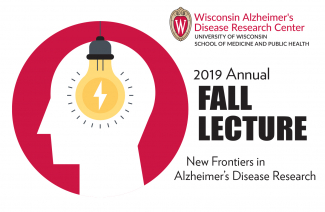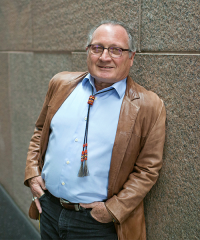
The Wisconsin Alzheimer’s Disease Research Center will host a free community event Wednesday, October 23, from 5 p.m.to 8 p.m., to share recent findings in the study of healthy aging, brain health, and Alzheimer’s disease prevention. Keynote speaker, Dr. Neil Henderson, will examine the connections between diabetes and dementia among American Indian people and share his research on prevention and community health interventions. Additional topics for the evening will focus on the event theme of New Frontiers in Alzheimer’s Disease Research.
“The field of Alzheimer’s disease research is progressing rapidly and twisting down new roads to bring us clues about how this disease starts, how it progresses, and how we can prevent it,” says Dr. Sanjay Asthana, director of the Wisconsin ADRC and professor of medicine (geriatrics) at the UW School of Medicine and Public Health. “The Annual Fall Lecture allows us the chance to report back to the community about the science behind brain health so they can use that information to take steps toward healthy aging and dementia prevention in their own lives.”
The event is free and open to the public. Registration is not required, but it is appreciated. For registration, event details, and parking, visit the event website.
Beginning at 5:00 p.m., a Healthy Aging Resource Fair will feature representatives from the UW Health Wellness Center, Aging & Disability Resource Center of Dane County, the Alzheimer’s & Dementia Alliance of Wisconsin, the Alzheimer’s Association, and a number of other service organizations and resources for patients with dementia and their families and caregivers.

Public talks will begin at 6:00 p.m. with the keynote address by Dr. Henderson, professor in the Department of Family Medicine and BioBehavioral Health and executive director of the Memory Keepers Medical Discovery Team on Health Disparities at the University of Minnesota Medical School, Duluth campus. Dr. Henderson, who is Oklahoma Choctaw, researches dementia and diabetes among American Indian people. Specifically, his work is on dementia and diabetes as an interactive syndrome, biological and cultural influences regarding recognition and treatment of dementia and diabetes, and community health interventions and education in the context of cultural diversity.
Two speakers from the University of Wisconsin School of Medicine and Public Health will also offer Alzheimer’s disease and dementia-focused presentations. Dr. Barbara Bendlin, associate professor of medicine (geriatrics) and an Alzheimer’s disease researcher at the UW, will present her work on the microbiome and gut-brain health connections. Dr. Nathaniel Chin, assistant professor of medicine (geriatrics) and a memory care doctor at UW Health, will discuss how new discoveries in the field of Alzheimer’s disease research are changing the way doctors and scientists define the disease.
Carol Koby, host of the radio programs “All About Living” and “Living Minutes” on HANK AM 1550 and 97.7 FM, will emcee the event.
The evening will conclude with an audience Question and Answer session.
Event details
New Frontiers in Alzheimer’s Disease Research
October 23, 2019, 5:00-8:00 p.m.
Gordon Dining & Event Center, UW-Madison campus, 770 West Dayton Street, Madison, Wisconsin
Schedule:
5:00-6:00 p.m., Healthy Aging Resource Fair
6:00-8:00 p.m., Speakers and audience Q&A panel
Speakers and talk titles include Dr. Neil Henderson: “Diabetes and Dementia among American Indians: Connections and Prevention;” Dr. Barbara Bendlin: “Microbes and Alzheimer’s Disease: What Do You Need to Know” and Dr. Nathaniel Chin: “The Evolving Definition of Alzheimer’s Disease.”
About the Wisconsin Alzheimer’s Disease Research Center
The Wisconsin Alzheimer’s Disease Research Center’s (ADRC) mission is to improve the lives of people affected by Alzheimer’s disease by facilitating innovative science that targets the prevention and treatment of the disease. It combines academic, clinical, and research expertise from the University of Wisconsin School of Medicine and Public Health and the Geriatric Research, Education and Clinical Center (GRECC) of the William S. Middleton Memorial Veterans Hospital in Madison, Wisconsin. Founded in 2009, the Wisconsin ADRC is a National Institute on Aging Designated Alzheimer’s Disease Research Center (P30-AG062715). It receives funding from private, university, state, and national sources.
- Log in to post comments



